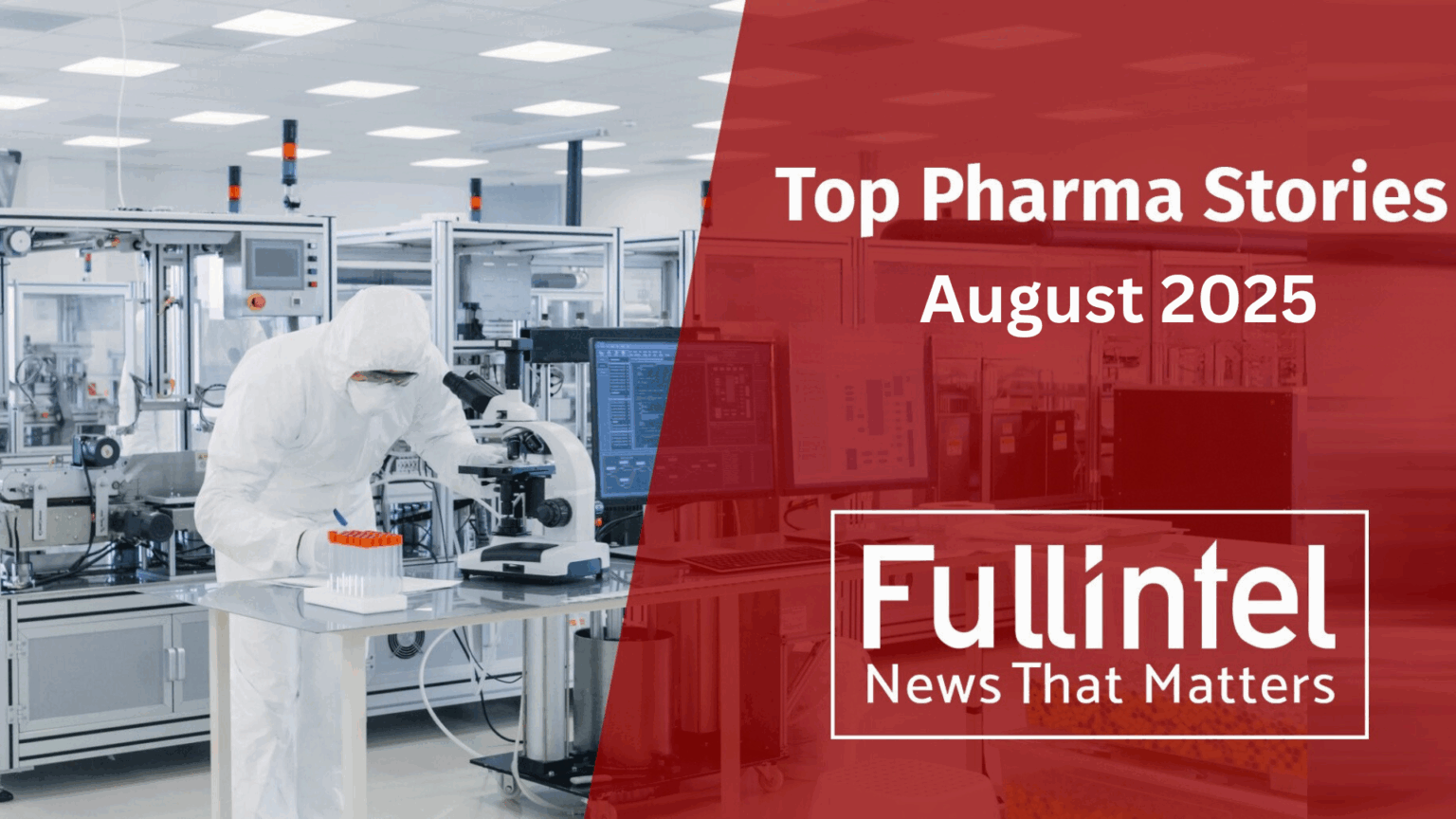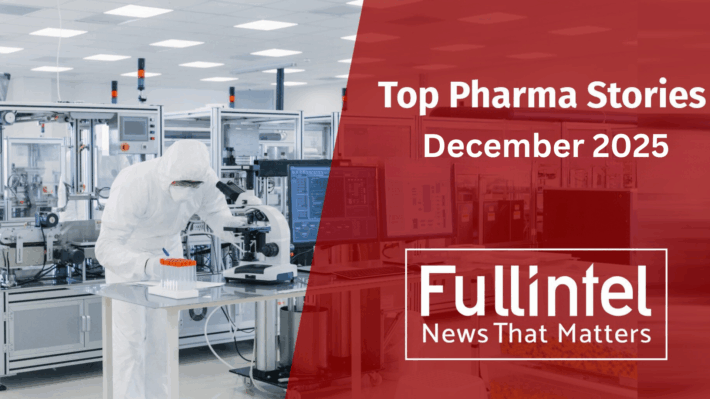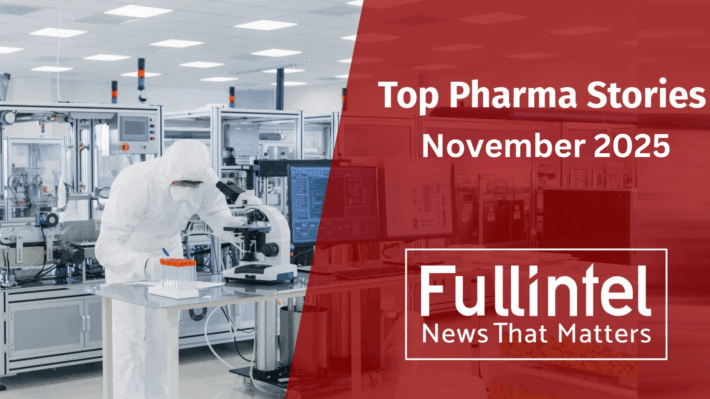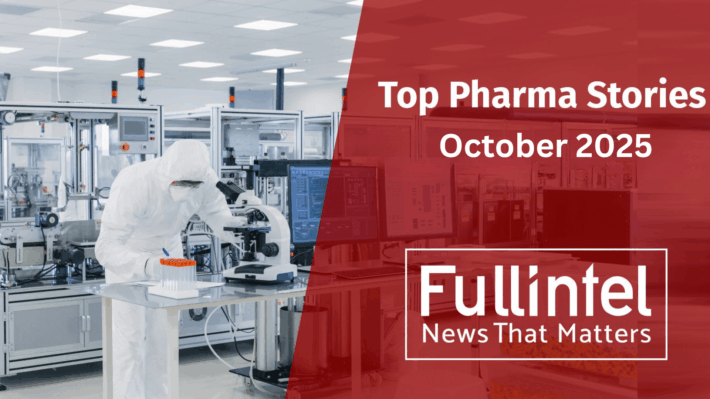Top Pharma News in August 2025

This month’s healthcare and pharmaceutical coverage highlights how political pressure, regulatory changes, and new technologies are reshaping access to care and influencing public trust. From government action on drug pricing and funding cuts to HIV programs to debates over AI-driven health advice, the industry faces complex challenges at the intersection of innovation, affordability, and safety. The Fullintel Hub provides timely insights to help stakeholders stay informed and prepared as the landscape continues to evolve.
August’s Top Stories:
Trump’s Drug Pricing, HIV Program Cuts, and ChatGPT Health Warning Lead August’s Pharma Discourse

Three key developments shape healthcare media coverage in August:
- Trump Threatens Pharma Giants Amid Drug Price Clash
- HIV Program That Saved Millions Faces Trump-Era Cuts
- AI Health Advice Questioned as Rare Illness Links to ChatGPT
President Trump threatens major pharmaceutical companies with a crackdown over drug prices, signaling renewed government pressure on the industry. A global HIV/AIDS program that saves millions faces significant cuts under his administration, raising concerns about future public health efforts. In a separate media backlash, ChatGPT draws criticism after advice about stopping salt intake reportedly leads to a rare medical condition, sparking debates over AI and health guidance.

A Closer Look at August’s Top Pharma Headlines:
Trump Threatens Pharma Giants Amid Drug Price Clash
President Trump threatens tariffs of up to 250% on imported pharmaceuticals to lower drug prices and bring manufacturing back to the U.S. He demands that 17 major drug companies match their U.S. prices to the lowest global rates within 60 days or face penalties. His administration also advocates for a “most favored nation” policy, tying U.S. drug prices to international benchmarks. Trump’s “America First” tariffs drive pharmaceutical investment in Puerto Rico, where companies such as Millicent Pharma plan a $45.5 million expansion, creating 73 jobs. At least seven firms have expanded operations, adding 1,600 jobs and over $220 million in investment. While drugmakers caution about higher costs and risks, discussions continue. Public and media responses are largely neutral, with social media showing skepticism and humor. Interest increases following Trump’s July 27 announcement, as the industry and policymakers weigh the affordability, innovation, and supply chain security implications.

HIV Program That Saved Millions Faces Trump-Era Cuts
The Trump administration plans significant cuts to PEPFAR, the global HIV/AIDS program credited with saving 26 million lives since 2003. Although the Senate restored some last-minute funding, significant reductions in budget and staff remain, with a narrowed focus on maternal and child HIV transmission, excluding key prevention efforts for groups such as LGBT individuals. Critics warn that the cuts and a rapid U.S. withdrawal from some countries risk reversing progress, particularly in low-income and conflict-affected regions. Former President Bush and advocates, including Bono, voice strong opposition, emphasizing the humanitarian importance of PEPFAR. Media coverage is largely neutral, but it emphasizes concerns over global health setbacks. Online reactions reflect anger and frustration, particularly among advocates who are concerned about vulnerable populations. Despite its significance, the story generates less social engagement compared to other healthcare news.

AI Health Advice Questioned as Rare Illness Links to ChatGPT
A U.S. medical journal, Annals of Internal Medicine: Clinical Cases, reports that a 60-year-old man developed bromism, a rare toxicity, after following ChatGPT’s advice to replace table salt with sodium bromide. The case underscores the risks of relying on AI for medical guidance, as the chatbot failed to provide critical health warnings. The report underscores that while AI can enhance access to information, it may also spread errors and should not replace professional advice. OpenAI has recently updated ChatGPT to handle health-related queries more effectively, but healthcare providers are urged to monitor the growing influence of AI on patient decision-making. Media coverage peaks between August 12 and 15, with online reactions mixed, ranging from surprise and humor to concern. Experts caution against overreliance on AI, emphasizing the continued need for professional medical consultation.

As political pressures, funding shifts, and the rise of AI continue to shape pharma, the path forward isn’t about rejecting technology but choosing it wisely. The industry is already seeing how domain-specific AI platforms built for compliance and evidence synthesis can set higher standards for accuracy and trust—offering a model for how innovation should support, not undermine, global health outcomes.
In the months that followed, this conversation around affordability and responsible AI deepened, with renewed political attention on drug pricing reforms, fertility access, and AI-driven cancer research reshaping healthcare narratives.
Angela is VP of Insights at Fullintel—a media intelligence company that specializes in news monitoring and analysis. She has worked in media measurement for 15 years, helping brands improve business results through data-driven, actionable insights. From public relations agencies like Lippe Taylor to media research firms like PRIME Research, she has consulted across industries, particularly healthcare and pharmaceuticals. She has presented and published several award-winning research papers about news content that drives recall, engagement, and brand trust. Her “Trust in Pharma” research outlines how biopharma brands can build and sustain trust.
She contributes knowledge at the intersection of academia and practice as director of the International Public Relations Measurement Commission and as a member of the International Public Relations Research Conference Board. Her contributions have been recognized with multiple industry awards, including PRNEWS People of the Year (Data & Measurement Game Changer), PRNEWS Top Women (Industry Champions), and AMEC Rising Star for innovation in communication measurement.





